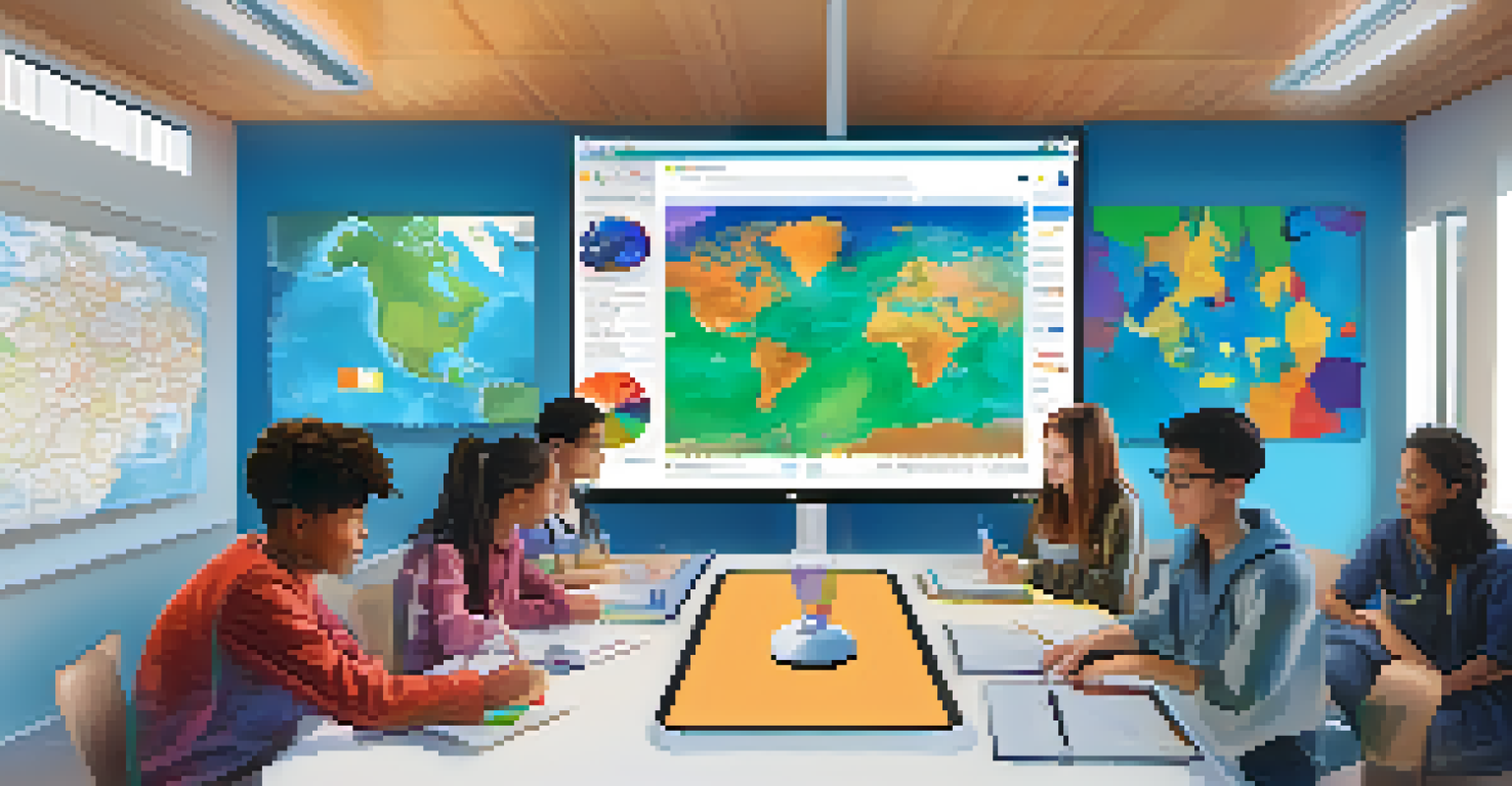Exploring AI's Potential in Global Education Initiatives

Understanding AI's Role in Education
Artificial Intelligence (AI) is reshaping many sectors, and education is no exception. By analyzing vast amounts of data, AI can identify learning patterns and tailor educational experiences to individual needs. This personalized approach can improve student engagement and retention, making learning more effective.
The great aim of education is not knowledge but action.
Imagine a classroom where each student has a digital tutor that adapts to their learning pace. AI can provide real-time feedback and suggestions, helping students grasp difficult concepts more easily. This not only boosts confidence but also fosters a love for learning.
Moreover, AI can assist educators by automating administrative tasks, allowing them to focus on teaching and connecting with students. As we explore AI's potential, we can envision a more efficient and responsive education system that meets the needs of diverse learners.
Enhancing Accessibility with AI Technologies
One of the most significant advantages of AI in education is its ability to enhance accessibility. For students with disabilities, AI-powered tools can provide tailored support, such as speech recognition for those who struggle with writing or personalized learning materials for different learning styles.

For example, AI can translate text into audio for visually impaired students or offer captioning for hearing-impaired learners. This inclusivity ensures that no student is left behind, creating a more equitable learning environment.
AI Personalizes Learning Experiences
AI analyzes student data to create tailored educational experiences, enhancing engagement and retention.
As AI technologies continue to evolve, they promise to break down barriers and open doors for students who may have faced challenges in traditional educational settings. This transformation can lead to a richer, more diverse learning community.
AI-Powered Learning Platforms and Resources
AI has given rise to a variety of learning platforms that offer interactive and engaging experiences. These platforms utilize machine learning algorithms to adapt content based on student performance, helping learners progress at their own pace. Think of it as having a personal coach cheering you on and adjusting your training plan.
Education is the most powerful weapon which you can use to change the world.
For instance, platforms like Coursera and Khan Academy use AI to recommend courses and resources that align with a learner's goals and interests. This tailored approach not only keeps students motivated but also enhances their overall educational experience.
Additionally, these platforms can provide analytics to educators, highlighting student strengths and areas for improvement. This data-driven insight empowers teachers to make informed decisions about their instructional strategies.
Global Collaboration Through AI in Education
AI fosters global collaboration in education by connecting students and educators from diverse backgrounds. Virtual classrooms powered by AI can facilitate cross-border learning experiences, allowing students to collaborate on projects and share ideas in real-time.
Imagine students from different continents working together on a science project, guided by AI tools that help them communicate effectively despite language barriers. This not only enriches their learning but also promotes cultural understanding and empathy.
AI Enhances Accessibility in Education
AI-powered tools provide essential support for students with disabilities, ensuring a more equitable learning environment.
As educational institutions embrace AI, the possibilities for international collaboration expand, preparing students to thrive in a globalized world. This interconnectedness can lead to innovative solutions to shared challenges, such as climate change and social justice.
Addressing Equity and Quality in Education
While AI offers promising solutions, it's crucial to address issues of equity and quality in education. Not all regions have equal access to the technology and resources necessary to implement AI effectively. Ensuring that all students benefit from AI innovations should be a priority.
For example, initiatives that provide training for educators in underserved areas can help bridge the digital divide. By equipping teachers with AI tools and knowledge, we empower them to create dynamic learning environments that benefit their students.
Furthermore, ongoing research and evaluation of AI tools are essential to maintain quality and ethical standards in education. It's vital to ensure that these technologies are used to enhance, rather than replace, the human connection that is fundamental to teaching and learning.
The Future of AI in Education
As we look to the future, the role of AI in education will continue to evolve. Innovations such as virtual reality (VR) and augmented reality (AR) combined with AI could create immersive learning experiences that transport students to different places and times. Imagine studying history by virtually visiting ancient civilizations!
Moreover, AI's ability to analyze and predict trends can help educators stay ahead of the curve, adapting curricula to meet the needs of future job markets. This proactive approach ensures that students are equipped with the skills they need to succeed in an ever-changing world.
Global Collaboration Through AI Tools
AI facilitates international learning by connecting students and educators, fostering cross-cultural projects and understanding.
Ultimately, the integration of AI in education holds immense potential to revolutionize learning experiences, making them more personalized, accessible, and relevant. The future is bright, and embracing these technologies can lead to a more informed and capable generation.
Challenges and Considerations in AI Adoption
While the potential benefits of AI in education are exciting, there are challenges and considerations to keep in mind. Issues such as data privacy, algorithmic bias, and the digital divide must be addressed to ensure that AI is used responsibly and ethically in educational settings.
For instance, schools must prioritize the protection of student data while leveraging AI tools. Transparency in how data is collected and used can foster trust among students, parents, and educators alike.

Additionally, training for educators on the ethical use of AI can help mitigate biases that may arise from AI algorithms. By approaching AI adoption thoughtfully, we can pave the way for a more equitable and effective educational landscape.
Conclusion: Embracing AI for a Brighter Educational Future
In conclusion, AI has the potential to transform global education initiatives, making learning more personalized, accessible, and collaborative. By harnessing the power of AI, we can address existing inequities and create learning environments that cater to the diverse needs of students worldwide.
As we move forward, it's essential to remain mindful of the challenges that come with AI adoption. By prioritizing ethical considerations and fostering collaboration among educators, policymakers, and technology providers, we can maximize the positive impact of AI in education.
The journey toward integrating AI in education is just beginning, and with thoughtful implementation, we can ensure that future generations are equipped with the skills and knowledge they need to thrive in an increasingly complex world.